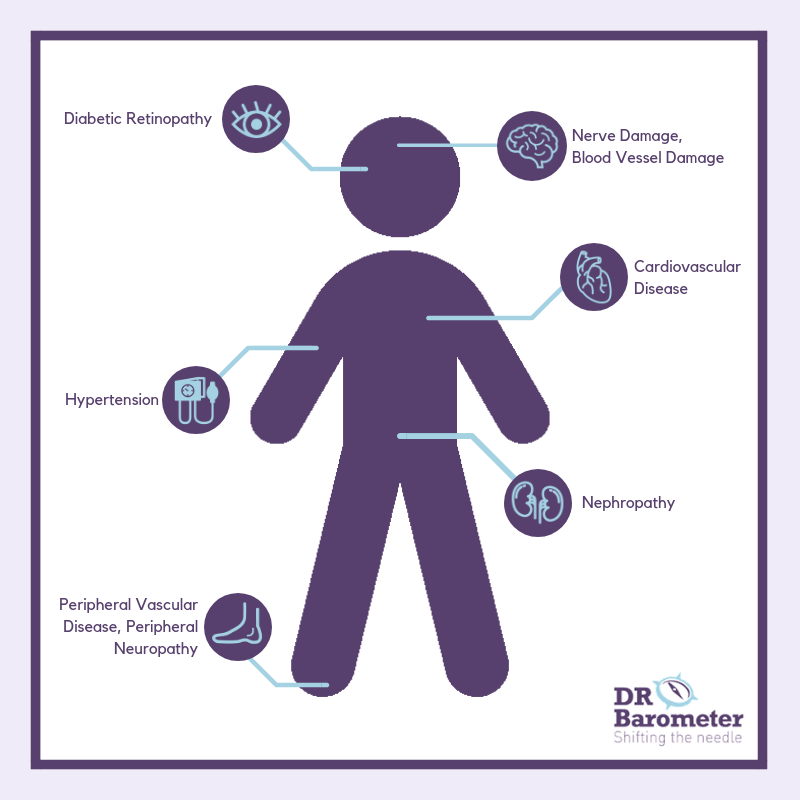Man(ageing) Diabetes #WDD2018
Diabetes mellitus (diabetes) is one of the most common noncommunicable diseases globally and continues to increase in numbers and significance. Diabetes is a chronic, systemic disease where the body can either no longer produce (Type 1) or make good use of (Type 2) the hormone insulin, which regulates blood sugar levels. Risk factors for developing diabetes include family history, overweight, unhealthy diet, physical inactivity, and increasing age[1].
 When a person with diabetes has higher than normal blood sugar (HBA1C) levels because they have not been managing their condition, this can damage blood vessels and nerves over time. Long-term complications of diabetes include:
When a person with diabetes has higher than normal blood sugar (HBA1C) levels because they have not been managing their condition, this can damage blood vessels and nerves over time. Long-term complications of diabetes include:
- Eye damage including diabetic retinopathy (DR) and diabetic macular edema (DME);
- Nephropathy (kidney disease);
- Cardiovascular disease;
- High blood pressure; and
- Nerve damage (neuropathy) in both the brain and the limbs.
These complications can lead to negative health outcomes such as vision loss or blindness, kidney failure, heart attack, stroke, and limb loss.
Diabetes in older age
Diabetes is one of the top causes of disability and death in older age, much of this resulting from the complications listed above[2]. However, some older persons living with diabetes may have full or good functional ability while others may have functional impairments or other chronic conditions and/or frailty. Both health status and function impact an individual’s ability to manage their diabetes as well as their access to quality health care.
How should older people with diabetes manage their condition?
Older people with diabetes should continue to maintain a healthy diet, exercise regularly, and monitor blood pressure. However, optimal blood sugar levels may be different in older age because there are increased risks for hypoglycemia and resulting falls – which can lead to further functional decline.
Health care providers and older people who have diabetes should work together to develop an individualized care plan to determine their optimal glycated hemoglobin (A1C) levels based on whether the person has other comorbidities or functional impairments to be mindful of in their diabetes care.
To prevent and manage complications of diabetes, older persons should:
- Receive counselling about how to manage their diabetes with lifestyle changes
- Be referred to testing for damage to the eyes, kidneys, and cardiovascular and nervous systems
- Be vaccinated for diseases that disproportionately impact older people, including influenza, pneumonia, and shingles
Read more about guidelines developed specifically for the care of older persons with diabetes:
- International Diabetes Federation (2014)
- Diabetes Canada (2017)
What does this mean for health systems and public policy?
To help people with diabetes continue to do what they value as they get older, diabetes management should be:
- person-centered: oriented to the needs and values of the older person with diabetes, and their long-term overall functional ability and wellbeing;
- interdisciplinary: involving the appropriate professionals including primary care, diabetologists/endocrinologists, diabetes educators, ophthalmologists, nephrologists, podiatrists, cardiologists, neurologists, among others; and
- coordinated: organized so that there are continuous linkages between relevant people and information involved in an individual’s care pathway.
Health systems should re-align to accommodate increasingly complex care needs, acknowledging that some older people who have diabetes may have one or more other chronic comorbidities or functional impairments. For example, the World Health Organization has proposed guidelines for Integrated Care for Older Persons (ICOPE), which outline the necessary elements of integrated care at the community level.
It is also worth noting that diabetes is associated with living with a lower income. The consequences of both diabetes and poverty manifest in later life – and this should be mitigated by offering supports specifically for persons with diabetes who are living in poverty to enable better self-management and access to care.
The IFA works to help older persons promote and maintain their intrinsic capacity across the life course by facilitating knowledge mobilization and promoting collaboration among leading experts:
- Join the DR Barometer Community – a growing global network of patient advocates and health professionals working to improve vision health outcomes for adults with diabetes through patient education and empowerment, guidelines and protocols, and coordinated care
- Read this blog about a recent expert meeting hosted by the IFA on vaccinations and older people with diabetes as an at-risk group.
[1] https://www.idf.org/aboutdiabetes/what-is-diabetes/risk-factors.html
[2] WHO World Report on Ageing and Health: https://apps.who.int/iris/bitstream/handle/10665/186463/9789240694811_eng.pdf;jsessionid=439C267FD3B1DB056D3EBFD35955551A?sequence=1


